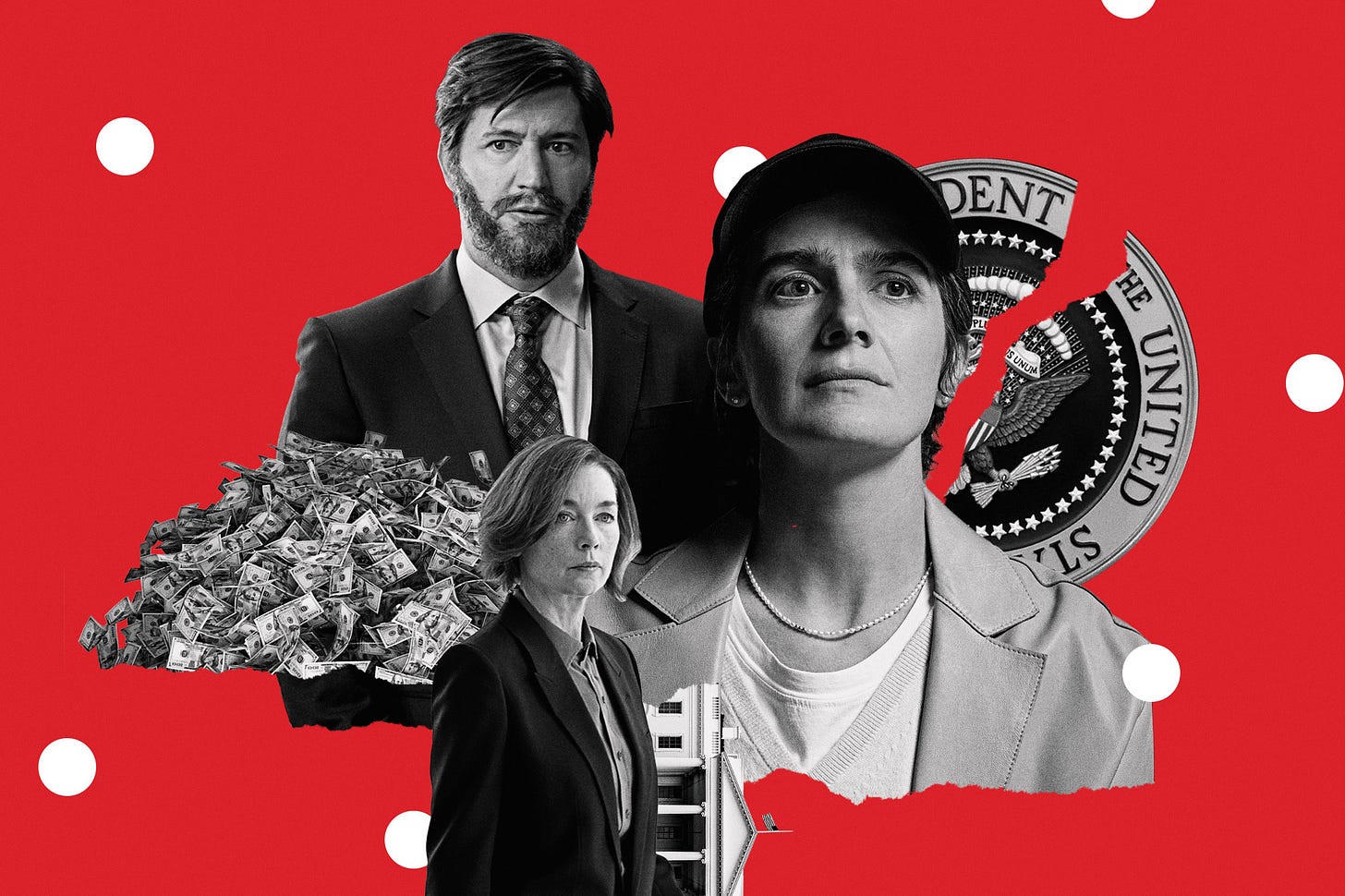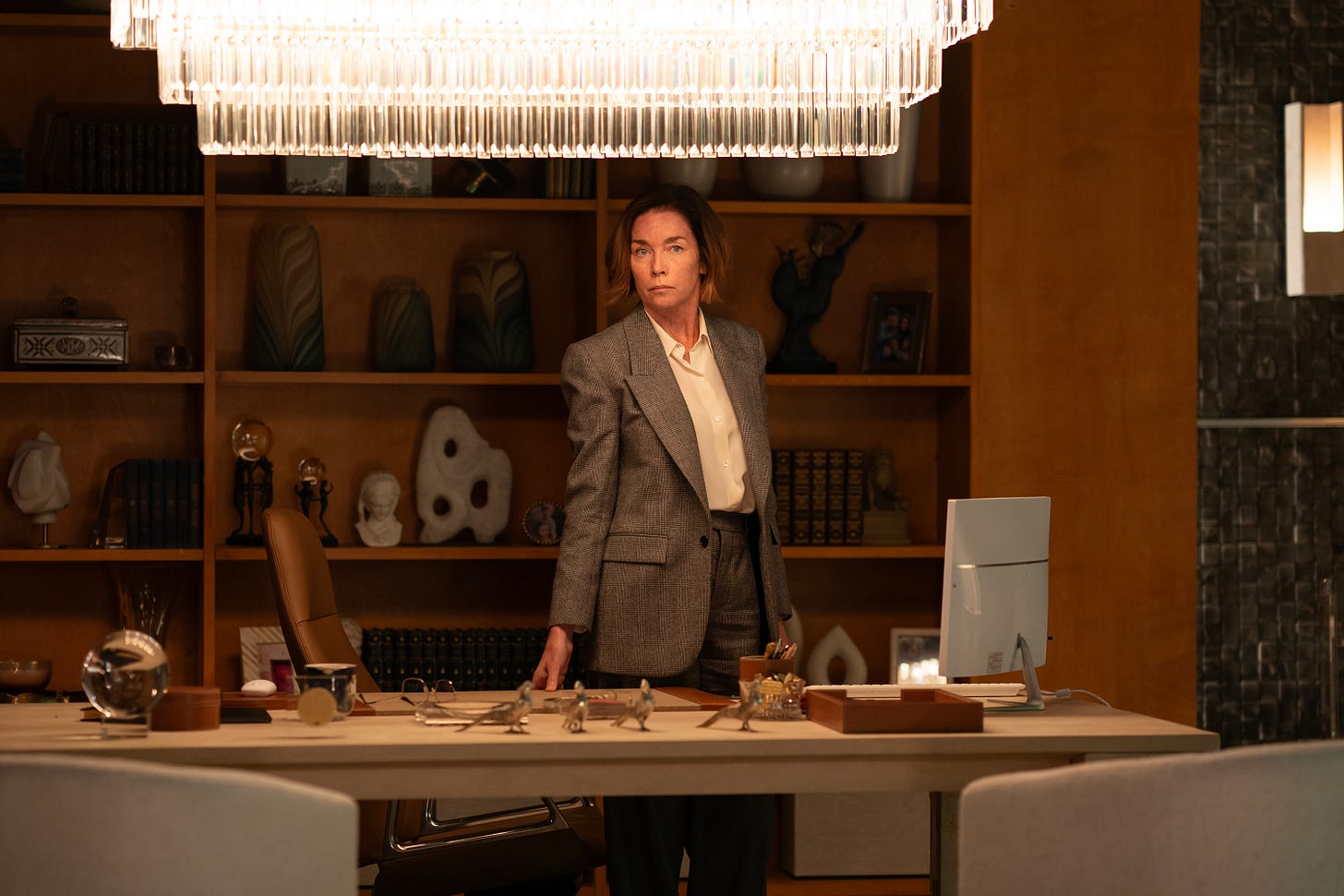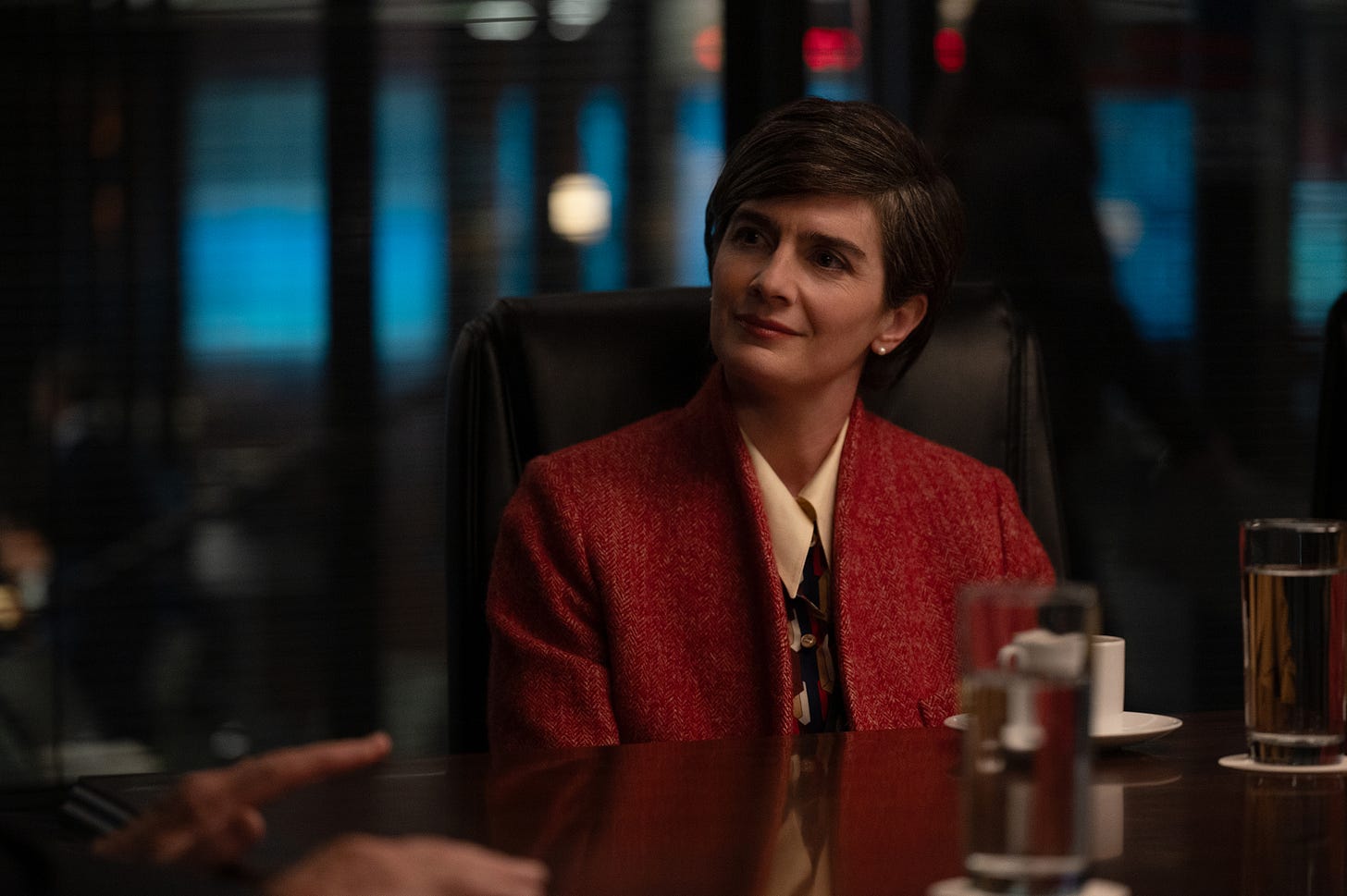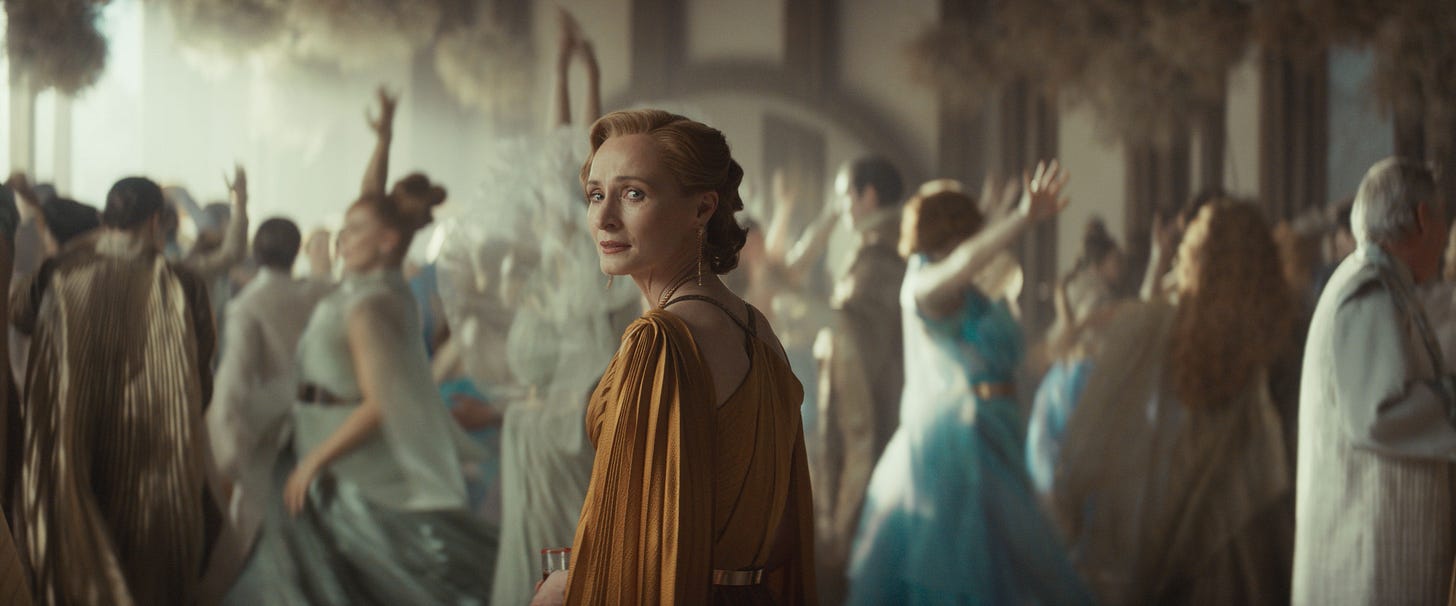The TV Year of Billionaires Puppeteering the President
All week, I'll dive deep on the most prominent trends of Emmy season. First up, how wealth influences power on TV. Plus: Martin Scorsese talks 'The Saints'

Today, with Emmy voting in full swing, I’ve got a look at several shows in contention this year that all share a common theme: the influence of the billionaire class on the White House, and how that unchecked access to power has dire consequences for the rest of us. (Hmm, I wonder why that seems so timely!) This is the first of my special five-part series this week about the most significant and meaningful trends of Emmy season, including how the industry has rallied around Los Angeles and why the ingenuity of cinematographers stole the show.
But before I get into the evil CEOs who are pulling the strings on several fictional POTUSes, I’m handing the laptop over to my colleague Christopher Rosen, who moderated a recent conversation with the one and only Martin Scorsese about the Oscar winner’s bid for Emmy glory this season. Watch it here and read on for more.
Christopher Rosen on Holy Man Marty
Scorsese had wanted to make a project about Catholic saints since he directed Raging Bull, the 1980 classic about former middleweight boxing champ Jake LaMotta, whose inability to control his abusive behavior and petty jealousies outside the ring left his personal life in tatters. “You have this guy who’s considered a monster, who’s considered a beast, but he’s not viewed as a human being,” Scorsese told me. “So right at the end of Raging Bull, I decided, ‘You know what, let’s explore this [dichotomy] even further. Let’s go back in time and make a series of films on the lives of who we call saints.’”
It took 45 years, but Scorsese’s hope has finally come to fruition with the Martin Scorsese Presents: The Saints, a seven-episode Fox Nation docuseries from creator Matti Leshem and executive producer Scorsese, where the Oscar-winning filmmaker serves as the show’s narrator. Season 1 episodes include retellings of famed saints like Mary Magdalene (whom Scorsese previously brought to the screen in The Last Temptation of Christ) alongside historical figures who aren’t as well known, including Moses the Black.
My conversation with Scorsese and Leshem followed a virtual screening of the Martin Scorsese Presents: The Saints episode, “Moses the Black” — hosted by The Ankler and Film Independent and presented by Fox Nation on June 12 — and revealed how the pair approached the material in unison. “Marty and I saw eye to eye about this very basic idea that faith is a radical human force, and we wanted to tell those stories. But the point is, these people who are saints, their lives are messy and defiant, and our lives are messy and defiant,” said Leshem, who directed “Moses the Black” and other episodes.
Scorsese enlisted longtime friend Kent Jones, the filmmaker and former New York Film Festival director, to write all seven episodes of season 1. For season 2, which was recently announced, Scorsese’s daughter Francesca stepped behind the camera to direct an episode. The burgeoning filmmaker posted about her work on the series on Instagram this month.
“I don’t have Instagram, so I don’t know,” Scorsese said to me when I asked about Francesca’s social media post. “Are you sure it’s true?”
In a conversation about faith and saints, perhaps it was fitting that I couldn’t know anything for sure. “That’s what we have to know in life,” Scorsese said. “Once we know that, we know.”
Eating the Rich

At the beginning of the second episode of Hulu’s drama series Paradise, Julianne Nicholson stands at the precipice of a vast underground bunker and declares to the man next to her, “Build me my city!”
It’s a perfectly over-the-top moment for her character, Samantha Redmond, nicknamed Sinatra, who has already been introduced to the audience as the steely billionaire constantly at the president’s right hand. The reveal at the end of Paradise’s premiere episode — that the show takes place entirely within that city built in a bunker, all after an apocalyptic event wiped out the rest of humanity — means the series is technically science fiction. But if the sight of a too-powerful billionaire on a TV episode that debuted on January 28, 2025, felt a little too real, well, that was part of the point.
“What do you do when your money doesn’t mean anything anymore, and how do you survive?” That’s one of many questions Glenn Ficarra and his writing partner, John Requa, were already asking themselves when Dan Fogelman, their collaborator from This Is Us, came to them with a new idea sparked by meeting an unidentified real-world billionaire. This was all well before Donald Trump re-entered the White House and brought Elon Musk with him, of course, but billionaires had already captured the imaginations of many TV writers’ rooms, and beyond.
“Even before the current situation that we’re in now,” says Requa, “I think people were questioning the power that these billionaires have and the wealth disparity, and can democracy exist with that big of a wealth disparity in our culture? That’s why it’s more than just our show. Ours was in the White House — that’s the difference.”

Maybe that was the difference when Hulu first ordered Paradise straight-to-series in the spring of 2023. But in one of those funny TV coincidences that doesn’t feel like that much of a coincidence at all, Paradise is one of three new shows this spring that features a billionaire specifically pulling the strings behind the scenes of a presidency. The other two are on Netflix. Zero Day, the limited series in which an ex-president played by Robert De Niro investigates a widespread conspiracy, features both Gaby Hoffmann and Clark Gregg as wealthy people with undue governmental influence. In a more comedic spin, The Residence has Ken Marino as a billionaire houseguest at the White House who keeps impeding a murder investigation, and at one point is a suspect himself.
These three shows come from distinctly different genres, with varying perspectives on the role of power in society. The Residence is even remarkably apolitical about it; in an interview, Marino stopped himself from getting political, and settled for calling his character “the biggest and most obnoxious” asshole he’s ever played. But the fact that all three shows would make room for a pushy billionaire — and sometimes pushy billionaires who aren’t entirely wrong — certainly says something about the moment we’ve been in, since long before Elon Musk started answering reporters’ questions from inside the Oval Office.
“A scene where two characters have completely opposing views, and they’re both right, is fascinating to me,” says Lesli Linka Glatter, who directed all six episodes of Zero Day. Created by former journalists Noah Oppenheim and Michael Schmidt alongside veteran TV producer Eric Newman, Zero Day asks the question, in Glatter’s words, “What is truth in a post-truth world? And what is each individual’s moral compass as far as it relates to truth? That’s probably the question we all need to ask ourselves now in this political climate. If we can’t agree on what is fact, how do we have a conversation?”
In Zero Day, after a cyberattack briefly wipes out all technology in the United States, De Niro’s character, George Mullen, is charged with finding out what caused it and encounters a wide range of influential, wealthy people in the process. One billionaire uses deepfakes to set Mullen on the wrong path; another is accused of being the mastermind of the whole operation, given that the technology she’s invented seems to be capable of just about anything.
According to Glatter, the chaos and uncertainty of Zero Day— a real term from the world of cybersecurity — is all the more realistic than we might like to think. “The one thing that has not happened, thank goodness, is a zero-day event that affects every industry at the same time,” says Glatter. “There’ve been many zero-day events, but they found the flaw in the software so that it can be repaired. So a single industry has been taken down. But this is the biggest fear of the intelligence community — that this will happen, and then panic would ensue.”

That’s more or less what does happen in Mountainhead, the original film from Succession creator Jesse Armstrong that debuted on HBO at the end of May. The president is an unseen, minor figure in Mountainhead, which is why I’m not quite counting it as part of this trend; given that Armstrong wrote and shot the film entirely since Trump’s inauguration, the subject matter is also no coincidence.
While watching tech billionaire Venis (Cory Michael Smith) prepare for a phone call with the president amid a global crisis unleashed by his app, though, it becomes frighteningly clear just how much our expectations have changed for who holds the real power. “He’s just a dude… a fuckin’ arrangement of carbon,” Venis says before the call, attempting to brush it off. Afterwards, he’ll only reveal, “He had some poorly informed criticisms.” In the end, it’s only with the intervention of the billionaires that the global crisis can end at all.
The One Billionaire Who Gets It Right

As it turns out, at least one of these fictional billionaires will hold on to power longer than the real one in the White House — Paradise is filming its second season, while as of this writing, Musk and Trump’s feud is ongoing-ish, with Musk apologizing on X, but likely not for long if past behavior is an indicator. What their public spat likely means, though, is that real-world billionaire influence will go back to being much more like what Requa and Ficarra had imagined.
“Sinatra represents what billionaires did before Elon Musk,” Requa says. “They operated in the background. When the cameras left, they went into Biden’s and every other president’s office. In many ways, I think our show is sort of old-fashioned because it’s a billionaire who’s pulling strings as opposed to just bulldogging their way through it.”
Sinatra may also be the most sympathetic of all these puppeteering TV billionaires, even though she ends the series holding one of the show’s most beloved characters hostage. “I always think the best villains are the ones that have a good reason to do what they do,” says Ficarra. “We worked really hard early on to not make her a mustache-twirling villain, and give her a humanity that drove her decisions and even the design of Paradise City.”
It’s not just Sinatra’s tragic backstory — a dead child revealed in flashbacks in the second episode — that makes her such a complex character. As played by the masterful Julianne Nicholson, Sinatra is whip-smart and very convincing, guiding the president (James Marsden) as well as Sterling K. Brown’s secret service agent Collins through the kind of complex decisions that you imagine face everyone in power. It’s all, in theory, in the name of preserving the bunker city of Paradise as a refuge in a broken world.
“She creates this world, this safe world, and as the season unfolds, she has this compunction to protect and preserve,” says Requa. “It all stems from this single tragedy.”
So, is there any hope for the wealthy to use their power for actual good? Not on our planet, but perhaps on another. The second season of the Star Wars prequel series Andor finds Senator Mon Mothma, a minor character in the original Star Wars films, brilliantly expanded for this series, abandoning her efforts to funnel her wealth to the resistance in favor of full-blown revolution. Mon, played by Genevieve O’Reilly, is not the kind of rebel we’re used to seeing from Luke Skywalker or even the show’s titular Cassian Andor. But she’s exactly the kind of rich person we probably need, committed to doing the right thing and willing to give up her fabulous wealth in the process. If only she weren’t science fiction.










